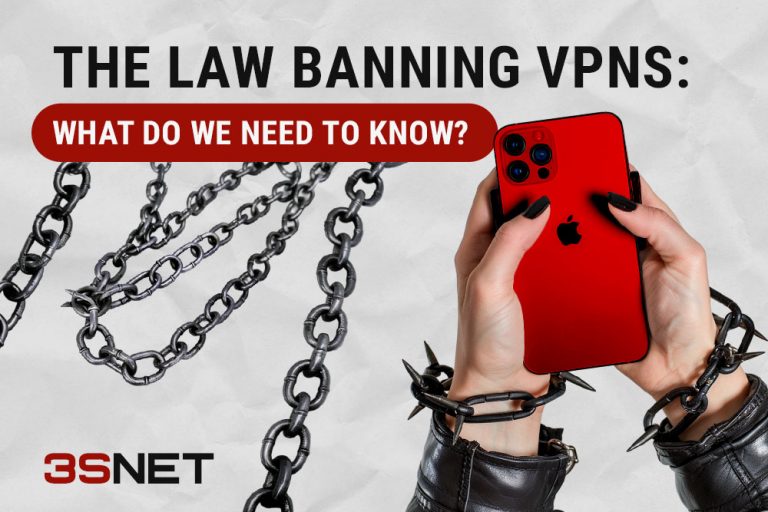
Last Updated: 23 september 2025
In 2025, Russia enforces strict regulation of VPN services, although there is no outright ban on their use by ordinary citizens. However, there are stringent restrictions on advertising, promotion, and attempts to use VPNs to circumvent blocks and access prohibited materials. On 3S.INFO, we thoroughly examine the nuances of the law, rules, and limitations regarding VPN usage in Russia.
- VPN (Virtual Private Network) is a technology that establishes a secure network connection over another network, such as the internet. The operating principle is universal across all types of VPNs: user traffic is encrypted and routed through a chain of servers distributed geographically worldwide, ensuring data privacy and security. For further details on this and other terms related to gambling and betting markets, read more in the “Knowledge Base”.
The Russian Law Prohibiting VPN Use: What You Need to Know
As of September 1, 2025, Federal Law No. 281 came into effect, regulating the advertisement and use of VPN services.
- Advertising and promoting VPN services and other means of bypassing blocks are prohibited.
- Significant fines have been introduced for promoting VPN services, as well as intentionally searching for banned or extremist materials using VPN.
- Using VPN for committing crimes (extremism, terrorist activities) is considered an aggravating circumstance and leads to stricter penalties under the Criminal Code.
- Using VPN itself is not illegal if it is not associated with unlawful activity (for example, remote work or protection of personal data).
Which VPNs are Banned in Russia?
In Russia, VPN services are banned and blocked if they:
- Refuse to cooperate with Roskomnadzor and do not filter access to restricted websites (Roskomnadzor requires technical access to block sites).
- Are openly advertised or promoted for bypassing blocks.
- Are used to search for or distribute extremist materials.
Public lists of officially blocked VPNs are published by Roskomnadzor.
Which VPNs are Allowed in Russia?
In 2025, the following VPNs are allowed for use in Russia:
- Corporate VPNs (for remote work and secure internal communications, provided they are not used for illegal purposes).
- Those VPNs that cooperated with Roskomnadzor, implemented filtering, and connected to the registry of prohibited resources.
- Individual closed solutions not intended for public distribution.
What Consequences Await for Violating New VPN Regulations?
In 2025, violations of new VPN regulations in Russia carry administrative and, in some cases, criminal penalties. Accidental or technical use of VPN is not considered a violation; fines apply only to intentional actions (such as deliberate searches for prohibited content).
Fines for advertising, promoting, and distributing VPN services:
- Citizens: from 50,000 to 80,000 rubles.
- Officials: from 80,000 to 150,000 rubles.
- Legal entities: from 200,000 to 500,000 rubles (repeat offenses up to 1 million rubles).
Fines for intentional search of extremist materials via VPN:
- Citizens: from 3,000 to 5,000 rubles.
Additional Measures and Consequences:
- Using VPN for criminal acts (extremism, terrorism, financing of banned organizations) is treated as an aggravating factor and results in harsher punishment according to relevant articles of the RF Criminal Code.
- Owners of VPN services refusing cooperation with Roskomnadzor or failing to filter access to prohibited websites may face fines up to 8 million rubles.
- If login/password credentials are shared with third parties, a fine of up to 200,000 rubles applies.
How Does the VPN Law Affect Regular Users?
The VPN law in Russia in 2025 significantly impacts user behavior, internet accessibility and digital freedom levels.
Regular users can still use VPNs for work, personal safety, and remote access, as long as it does not involve breaking the law. However, users must adhere to the rules and use VPNs only for legal purposes (corporate communications, remote work, data protection).
List of Restrictions When Using VPN
- Any attempt to search for extremist materials, bypass government blocks, or participate in questionable schemes via VPN carries a real risk of administrative or even criminal penalties.
- When transferring data via VPN (especially corporate data), additional legal checks are now required: the service must either collaborate with Roskomnadzor or be a private/local solution.
- The overall level of security remains unchanged for regular legal VPN use, but the range of legal services has narrowed, and business/corporate VPNs are permitted only for official purposes.
- Users may receive fines for non-compliance with bans, while owners of corporate or paid solutions need to monitor updates to the list of approved services and respond promptly to legislative changes.
- The “aggravating circumstances” rule for committing crimes via VPN effectively restricts individuals from engaging in any risky actions protected by these services.
Thus, the law tightened choices, limited available services, and increased accountability, yet VPNs remain accessible for legitimate tasks among regular users.
Complete List of Documents and Laws Regarding VPN Ban in Russia
- Federal Law No. 281 dated July 31, 2025 “On Amendments to the Administrative Offences Code of the Russian Federation and the Criminal Code of the Russian Federation concerning the Use of VPN” (effective since September 1, 2025).
- Articles 13.52 and 13.53 of the Administrative Offences Code of the Russian Federation — administrative liability for advertising VPN services and searching for extremist materials using them.
- Amendments to Article 63 of the Criminal Code of the Russian Federation — use of VPN during commission of crimes as an aggravating circumstance.
- Federal Law No. 276 dated 2017 — initial prohibition on providing access to blocked resources.
- Federal Law No. 225 dated 2024 — inclusion of VPN use in the list of aggravating circumstances.
Share it with your friends via favorite social media






























